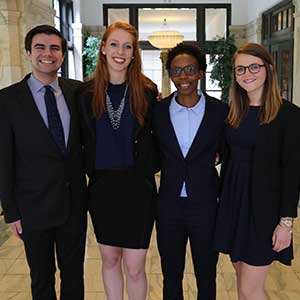What return do venture capitalists typically expect on their investments? In a 2016 Forbes report, one investor said her firm seeks at least 25 percent or a cash-on-cash return of three times the initial investment over five years or nine times over ten years.
Because a venture capitalist (VC) is a shrewd business analyst who evaluates proposals with an eye toward maximum returns, it’s common practice to evaluate proposals from every conceivable angle.
Freshmen in the Byrum School of Business gain first-hand knowledge about financing a small business through BUS 109, a nine-credit course in which they pitch an original business concept to Indianapolis executives with a stake in the outcome.
 Business students at Marian get significant business experiences that become increasingly complex over the course of their four-year degree program. Upon graduation, they have relevant and meaningful skills that employers value.
Business students at Marian get significant business experiences that become increasingly complex over the course of their four-year degree program. Upon graduation, they have relevant and meaningful skills that employers value.
Providing students with SBEs
BUS 109 is the first in a series of four required significant business experiences (or SBEs) that are embedded in Marian’s business curriculum, says Dr. Russell Kershaw, dean of the Byrum School.
Each SBE becomes increasingly complex over the course of their degree program, so students have relevant, meaningful experience when they graduate.
“In this course, student teams develop a comprehensive plan for a real product or service they will market and sell to the campus community. The winning team launches and operates their business until they’ve made a profit and can repay their loan with interest. As an added incentive, remaining profits are divided among team members. Some teams donate a portion of their profits to charity,” Kershaw explains.
The goal?
“We want our business students, some of whom will go on to become entrepreneurs or operate a family business themselves, to gain an understanding of and appreciation for how small businesses function,” adds Kershaw.
The course introduces basic concepts, theories, best practices, trends, and tools in finance, accounting, economics, marketing, and management—everything needed for a successful business.
Students learn what goes into a sound business plan, like a market analysis, funding requirements, financial projections, sales strategies, and a management strategy. They also develop key communication, collaboration, problem-solving, and other skills they’ll use throughout their studies, during internships, and in the workplace after graduation.
They may start small, but by the time these freshmen are seniors they will be actively engaged in project-based learning like developing acquisition strategies for Cummins, a global Fortune 500 corporation.
Swimming with big fish
Typically, there are 20 teams of four to six students who compete against each other during the fall semester with a smaller number of teams competing each spring.
Once teams have finalized their plans and have a prototype or samples of their proposed product or service, they are ready to participate in the first of two rounds of judging.
Judges utilize pre-determined scoring criteria to select the best four teams, including a wild-card pick, who go on to compete in a second, more intense round of competition.
Second-round finalists continue to put polishing touches on their concepts and presentations between rounds, like creating commercials, advertisements, and posters promoting their businesses.
“Judges are local business executives and civic leaders who also serve as members of the Byrum School’s advisory board,” Kershaw notes. “Because they pool resources to fund the winning venture, judges pay very close attention to the details and expect a return on their investments.”
Needless to say, students enjoy the friendly competition but they play to win and for the opportunity to run a profitable campus-based business.
Parents, grandparents, and friends of the Byrum School are invited to attend the second round of judging, which culminates in an evening event.
By the end of the semester, judges say they can’t believe Marian students are just freshmen. “Our judges are blown away by the quality of their ideas and their impressive work," adds Kershaw.
To learn more about the Byrum School’s experiential curriculum and business degrees, contact the Office of Undergraduate Admission at 317.955.6300, 800.772.7264, or admissions@marian.edu.